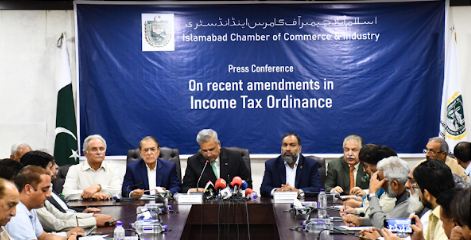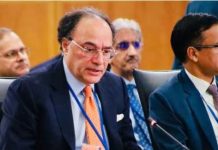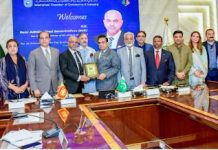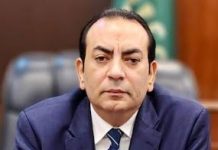ISLAMABAD, MAY 6 /DNA/ – In a media briefing, President of the Islamabad Chamber of Commerce and Industry (ICCI), Nasir Mansoor Qureshi, voiced deep concern over the recently promulgated Tax Laws (Amendment) Ordinance 2025. Speaking on behalf of thousands of traders, industrialists, and the service sector, he rejected the ordinance as regressive, unconstitutional, and damaging to the country’s already fragile economy. Flanked by ICCI Group leader Tariq Sadiq, Senior Vice President Abdul Rehman Siddiqui, Council members Mian Akram Farid, Mohammad Ejaz Abbasi, Mian Shaukat Masood, Chairman FPCCI capital office Karim Aziz Malik and Coordinator FPCCI Capital Office Sohail Malik, Qureshi emphasized that this was not just an ICCI concern, but a unified stance of the entire business community.
President Qureshi criticized the ordinance for granting sweeping powers to the Federal Board of Revenue (FBR), including the authority to freeze bank accounts, seal business premises, and confiscate properties.
He described these measures as a blatant violation of due process and constitutional protections, particularly Section 137(2) of the Income Tax Ordinance, which grants taxpayers a 30-day compliance period even after an adverse appellate decision.
Such unchecked authority, he warned, creates fear, disrupts commerce, and undermines business confidence.
The ICCI President further condemned the move to post tax officers inside business premises, calling it an invasive and unprecedented form of enforcement that infringes on constitutional rights to privacy and business freedom.
Rather than encouraging compliance, such steps, he argued, amount to harassment and surveillance.
He also questioned the timing of the ordinance, which was passed through a presidential order just days before Parliament was scheduled to convene, raising serious doubts about the government’s intent and its respect for democratic norms.
Highlighting the economic fallout, Qureshi noted that Pakistan’s industrial output has already contracted by 3.91% in FY2024, and foreign direct investment has fallen by 22.5% in the first half of FY2025. In this context, coercive policies risk pushing more businesses into the informal sector or forcing them to shut down altogether.
He pointed out that despite increasing tax raids between 2018 and 2022, the FBR’s own data shows little improvement in tax collection from the informal economy, proving that coercion does not lead to reform.
Calling the ordinance an act of economic strangulation, Qureshi concluded by demanding its immediate withdrawal.
He urged the government to engage in a transparent, parliamentary process and consult business stakeholders in the formulation of any future tax reforms. “We would rather shut down our businesses than operate under such arbitrary and unconstitutional frameworks,” he declared, reaffirming ICCI’s commitment to protect the rights and survival of Pakistan’s business community.
The ICCI group leader, Tariq Sadiq, strongly criticized the proposed amendment, terming it a “draconian law” that would severely impact businesses in the country. He reaffirmed the ICCI’s commitment to protecting the rights of the business community.
Council Member Mian Akram Farid suggested that the FBR should focus on widening its tax net through systemic reforms and addressing bottlenecks, rather than repeatedly targeting those already within the tax net. This approach, he argued, would be more effective in increasing tax collection and promoting economic growth.
Those prominent among the attendees included Irfan Chaudhry, Waseem Chaudhry, Malik Abdul Aziz, Rohail Anwar Butt, Malik Mohsin Khalid, Imran Minhas, Naveed Satti, Ms. Shumkla Siddiqui former President Aamir Waheed, former Senior Vice President Faad Waheed, former Vice President Khalid Chaudhry, Advisor to ICCI President Naeem Siddiqui and Office bearers of local markets.

















